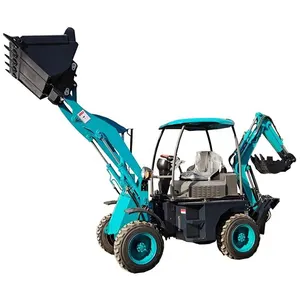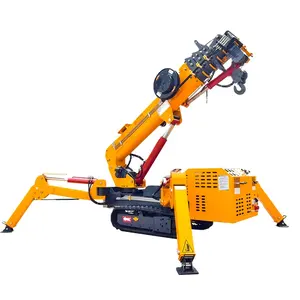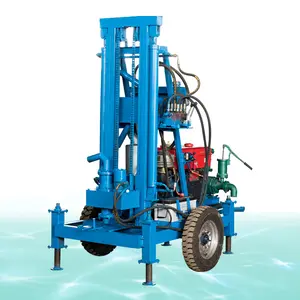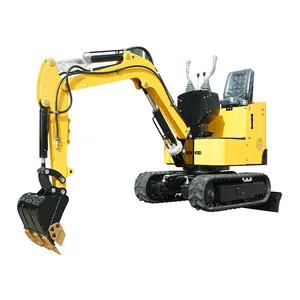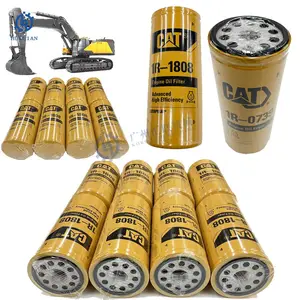Popular in your industry





































































Related Searches:






















































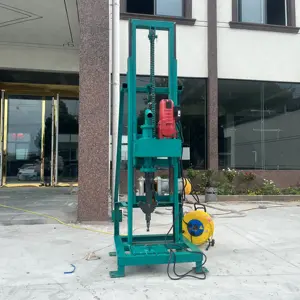

































































































Top categories
About farm irrigation water well drilling rig
The farm irrigation water well drilling rig is a highly specialized piece of equipment, meticulously designed to facilitate the extraction of groundwater for agricultural irrigation. This machinery is pivotal for farmers who rely on consistent water sources to cultivate crops and sustain livestock, particularly in areas where rainfall is insufficient. The water well drilling rig is a testament to human ingenuity, allowing for the efficient tapping of aquifers and ensuring the prosperity of agricultural endeavors.
Types and Characteristics of Water Well Drilling Rigs
Within the category of water well drilling rigs, there exists a diverse array of types, each tailored to specific drilling demands. Portable rigs are engineered for ease of movement and quick setup, ideal for farms with difficult terrain. Tractor-mounted rigs offer robust drilling capabilities, often preferred for their power and stability in varied soil conditions. Trailer rigs strike a balance between portability and power, making them suitable for a wide range of agricultural settings. Each type of rig is designed with a particular focus on soil and rock formation compatibility, ensuring that farmers can select a model that aligns perfectly with their land's geological makeup.
Structure and Operational Components of a Drilling Rig
The farm irrigation water well drilling rig is an assembly of sophisticated components, each playing a vital role in the drilling process. The mast, a towering structure, is the backbone of the rig, supporting the drill string and enabling its precise manipulation. The drill bit, powered by a rotary table or a top drive system, bores into the earth with finesse and accuracy. A mud system circulates drilling fluid to cool the drill bit, stabilize the well pressure, and evacuate the drill cuttings. The power system, which is the heart of the rig, energizes the entire operation, often through a diesel engine or an electric motor. These components are the result of rigorous engineering, designed to synchronize seamlessly for optimal drilling efficiency.
Materials and Engineering of Drilling Rigs
The construction of a water well drilling rig is a study in material science and engineering excellence. The drill mast and pipes are typically fashioned from high-carbon steel, prized for its resilience and endurance under stress. Bearings and gears, the rig's moving parts, are crafted from alloys that resist wear and tear, ensuring smooth operation over time. These material choices are deliberate, aimed at delivering a rig that not only performs under challenging conditions but also withstands the test of time, resisting the corrosive and erosive forces inherent in drilling operations.
Business Usages and Applications Across Industries
The versatility of the drilling rig extends its utility beyond agriculture into industries such as construction, where it is instrumental in laying foundations, and mining, where it aids in mineral exploration. In the environmental sector, these rigs play a crucial role in soil testing and groundwater assessments. For businesses, the ability to access groundwater translates into cost savings and operational reliability. The rigs' multifunctionality also allows for adaptation to various other applications, underscoring their value as a multifaceted tool in numerous commercial ventures.
Functions and Tasks of a Water Well Drilling Rig
The primary function of a farm irrigation drilling rig is to create access points to subterranean water sources. It achieves this through a combination of drilling techniques, capable of piercing through layers of soil and rock to reach the water table. Beyond drilling, these rigs are equipped to install casings to reinforce the wells, ensuring their structural integrity and longevity. Some advanced models offer directional drilling features, enabling operators to navigate around sub-surface obstacles and tap into water sources that are not vertically accessible from the drilling site.
Distinctive Features and Unique Selling Points
Key features of the water well drilling rig include its high drilling efficiency, which significantly reduces the time required to establish a well. The rigs are designed with user-friendly interfaces, simplifying the complexities of drilling operations for operators of varying skill levels. Their compact design facilitates ease of transport from one site to another, while the rigs' adaptability allows them to be customized for specific drilling requirements. These attributes distinguish the rigs in a competitive market, offering users a blend of practicality, performance, and versatility.
Benefits and Positive Outcomes for Users
The deployment of a water well drilling rig on a farm can lead to transformative outcomes. It enables agriculturalists to cultivate a degree of water autonomy, which can be critical during droughts or in arid regions. The assurance of a consistent water supply can lead to more predictable crop yields and the possibility of expanding agricultural operations. For businesses, the rigs provide a means to reduce dependence on municipal water supplies, which can be both cost-prohibitive and unreliable. The environmental benefits of utilizing groundwater responsibly also contribute to the sustainability of agricultural practices, aligning with global efforts to conserve water resources.
How to Operate, Choose, and Maintain Your Drilling Rig
Effective operation of a farm irrigation water well drilling rig begins with a comprehensive understanding of its mechanics and capabilities. Operators should be well-versed in the rig's functions and safety protocols. When selecting a rig, factors such as the anticipated well depth, soil type, and water table depth are critical considerations. Maintenance is key to the rig's longevity; this includes regular servicing, timely replacement of worn parts, and adherence to cleaning protocols to prevent the buildup of drilling by-products.
Target Audience and Meeting Their Needs
The water well drilling rigs cater to a diverse clientele, including small to large-scale farmers, construction firms, mining companies, and environmental agencies. Each rig is engineered with the end-user in mind, ensuring that it meets the specific requirements of the task at hand. For instance, compact, portable rigs are ideal for small farms or remote locations, while larger, more powerful rigs are suited to commercial and industrial applications where deeper and wider wells are necessary.
What are the key selling points of this drilling rig?
The farm irrigation water well drilling rig stands out for its competitive pricing, operational simplicity, and multifunctional design. Its manufacturing flexibility allows it to be tailored to a broad spectrum of drilling requirements, enhancing its appeal to a wide customer base. The rig's high productivity, coupled with its low maintenance costs, make it a cost-effective investment, while its energy-saving features and high safety standards underscore its market desirability.
What after-sales services are provided?
Post-purchase, customers of a water well drilling rig can avail themselves of extensive after-sales services. This encompasses online and video technical support, as well as the provision of engineers for overseas service, ensuring that any operational issues can be promptly and effectively addressed. Field maintenance and repair services, along with support from third-party overseas agents, guarantee that the rig remains in peak condition, maximizing its operational lifespan.
How does this drilling rig contribute to energy savings?
The design of the farm irrigation drilling rig emphasizes energy efficiency. Through the integration of low voltage components and state-of-the-art drilling technologies, the rig operates with a reduced energy footprint. This not only leads to lower operational costs but also aligns with environmental sustainability goals, making it an attractive option for businesses conscious of their ecological impact.
